Removing from your favourites..

Tell us what you think
Help us improve our website
Provide feedback
Please rate your experience.
Please leave a comment. We will use your feedback to help improve this website, however we are unable to action or respond to any queries or requests for assistance.
Claiming small business tax deductions
- Course overview
- Knowledge check
- Quick links
- Action plan
Business travel expenses
There are some important rules for travel expenses. Travel expenses incurred before you start your business are not usually deductible and a deductible trip needs to demonstrate a clear connection to your business activities.
Where expenditure is part business and part private, you need to apportion your claim. This means you exclude the private component from your claim. For example, air fares are usually deductible, provided the primary purpose of the trip is business. If the trip was for business and pleasure, you must apportion the cost. You can claim accommodation and meal expenses for the business part of the trip, but you can’t claim for a holiday before or after that.
Records are important to substantiate your claim. They could include receipts, boarding passes and a diary. You must keep a travel diary of your activities if you are away 6 or more consecutive nights on business travel.
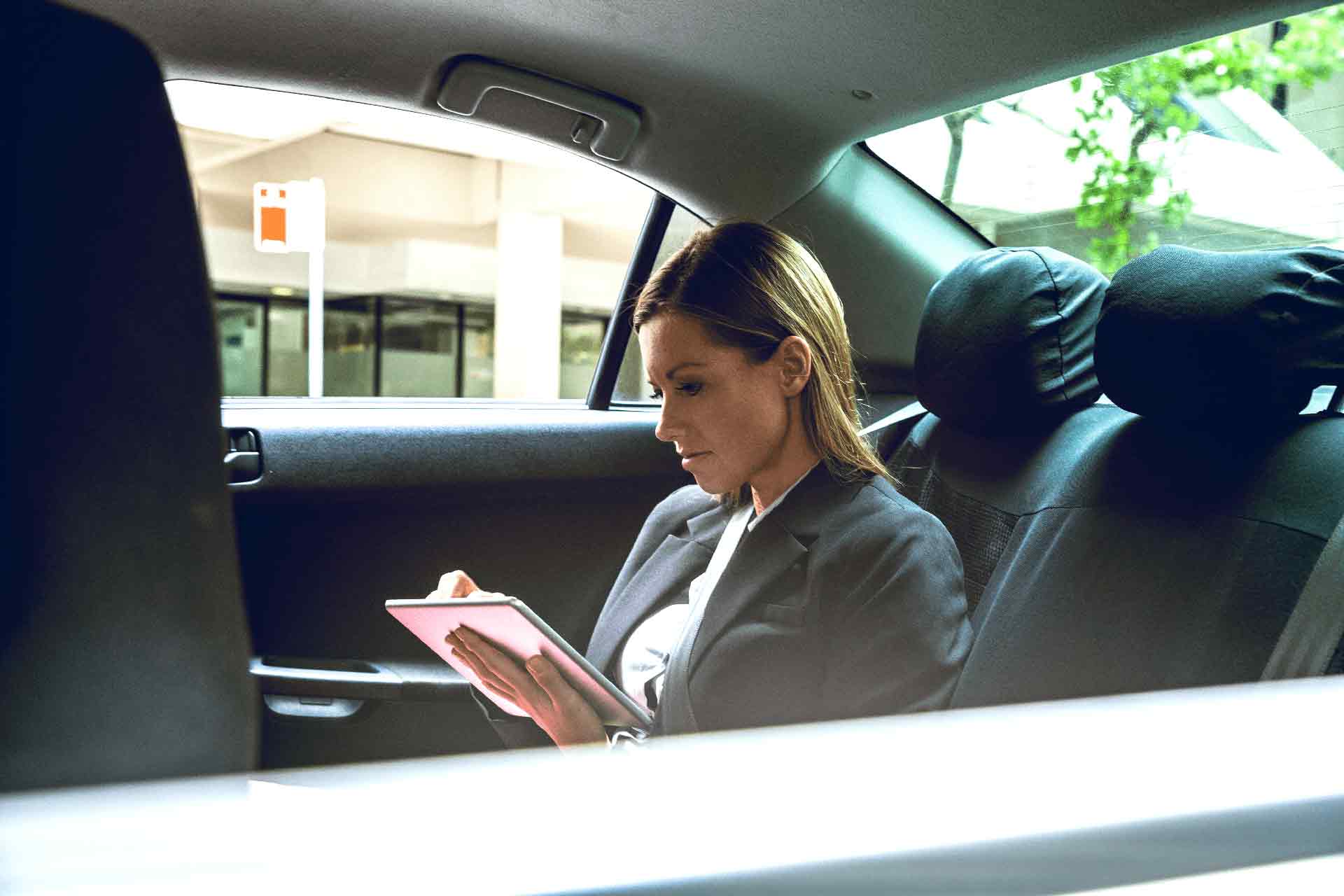
Accounting for private use of assets
Expenses you can never deduct, expenses you can deduct over time, stock and asset records, expenses you can deduct immediately, other deductions records, motor vehicle deductions, motor vehicle deductions records, related courses, course feedback.

19th July, 2021
Work travel expenses: What you can (and can’t) claim
Knowing exactly what deductions apply to travel expenses can save a heap of hassle at tax time.
The Australian Taxation Office (ATO) has released a new ruling that clarifies what expenses employees can deduct for work-related travel.
The new ruling, Income tax: When are deductions allowed for employees’ transport expenses? was released this week, bringing together and clarifying the rules for business advisors and their clients alike.
Key takeaways:
- The ATO’s new ruling sheds light on what travel expenses employees can and cannot claim
- Travel between work locations (neither of which are your home), is typically tax deductible
- Incidental work-related travel, such as a receptionist who makes a stop to pick up office newspapers on their way to work, can’t be claimed on tax
Travel from home to a regular place of work generally isn’t deductible. The ruling states that even if you travel to work by plane, receive a travel allowance or make incidental business-related stops on the way to work, you still cannot claim your travel expenses.
But moving between two separate work locations – like driving from your office to a construction site, or from your business to a meeting at a client’s office – can be claimed.
Tax specialist and accountant, Leo Hollestelle said the ruling is well timed ahead of the busy End of Financial Year period.
“It’s timely that these views are brought together and codified into a single ruling,” said Hollestelle. “Tax advisors will be able to more easily familiarise themselves with the rules and in turn advise their clients on it.”
What are work-related expenses?
Work-related expenses are expenses that you incur in the course of gaining or producing your assessable income.
What work-related travel expenses can I claim?
Transport expenses you incur while travelling between work locations are usually deductible. The travel must occur while gaining or producing your assessable income.
While you can’t usually deduct expenses for travelling between your home and work, you might also be able to deduct the cost of travel from your home to somewhere other than your regular place of work. This might be, for example, to attend a client’s premises or one of your employer’s other offices.
To work out if travel expenses are work-related, things like these are taken into consideration:
- Does the travel fit within your duties of employment?
- Do the travel expenses arise out of your employment and not your personal circumstances?
- Is the travel relevant to the practical demands of carrying out your work duties?
- Has your employer asked you to travel?
- Has the travel occurred during normal work time?
What work-related travel expenses can’t I claim?
Transport expenses that you incur for travel between your home and a regular place of work are not deductible.
If there is a close connection between travel and your private or domestic life, this will usually not be considered deductible. For example, if you travel to your regular place of work from another location in which you undertake private activities, for example a library or a holiday house, the cost of the travel is not deductible.
If you happen to live a significant distance from your regular place of work, your travel expenses are usually considered private and not deductible.
You may also not deduct expenses that are capital, private or domestic in nature. Transport expenses that may be considered capital in nature include, for example, the cost of purchasing a car. Ask your advisor whether such expenses may be recognised under another tax provision.
How much can you claim for work-related expenses?
You can only claim the actual cost of the expenses themselves. These will need to be proven with receipts and/or other written documentation. Your advisor will be able to help you with this.
READ: How to save tax in Australia – 15 tax minimisation strategies
How to calculate work-related travel expenses
You can claim deductions for work-related travel expenses in your tax return , but how you do this depends on the expenses themselves. (See also Claiming overseas-travel expenses , below.)
If your expenses relate to a car you own, lease or hire, you may be able to use the logbook method or the kilometres method .
READ: How long does it take to get a tax return?
Working-away-from-home tax deductions
If your employment requires you to travel away from home overnight, because of your employment (and not because of private circumstances like where you choose to live, for example), the transport expenses incurred in travelling to your alternative work location will usually be considered deductible.
Claiming overseas-travel expenses
If you travel overseas for work, you might be able to deduct expenses relating to flights, accommodation, meals, transport or other minor things (like taxis or using hotel wifi). You’ll need to keep records such as receipts and you may also need to keep a travel diary.
Where’s your regular place of work?
Interestingly, there are several exceptions that – if claimed correctly – can give you an edge come tax time. This is especially true when it comes to defining what a “regular work location” actually is.
For example, imagine you currently work for a business with an office 15-minutes from your home.
But you’re asked to cover a long-service vacancy for six months at another of your business’s offices one hour away. Because this new office becomes your regular place of work for a sustained period of time, travel to and from it cannot be claimed on tax.
But, if your period of work was only for three months, then it could be argued that the second office never became a regular place of work.
Therefore, travel could potentially be claimed on tax.
This is a call to take care in making any assumptions about what you can actually claim. As the ATO ruling states, ‘the full facts and circumstances of the specific working arrangement in place must always be considered in determining the nature and deductibility of the transport expenses incurred’.
And that’s something to keep in mind when it comes to all travel-related tax claims this tax time, as it could be this ruling also indicates an increase in scrutiny for travel-related claims.
“While the ruling is very much in line with the Commissioner’s existing views on travel expenses, the timing is worth noting,” said Hollestelle.
“After a year where many employees have been working from home, it may be the ATO is concerned there will be both workers and employers seeking to make dubious claims in the tax period ahead.”
What else do I need to know?
Find more guidance on transport and travel expenses on the ATO website.
Always seek advice on your individual situation from an accredited business advisor or tax specialist to find out exactly how tax changes and updates might impact your business.
Need an advisor? Find one today with MYOB’s Find an Advisor directory .
You might also like
Software tools you need that can help with eofy, 6th jun, 2024 by kellie byrnes, 7 common mistakes smes make with their invoicing, 3rd jun, 2024 by kellie byrnes, 5 last-minute tax-time tips for aussie business owners, 29th may, 2024 by myob team, subscribe to be updated on all things myob.
- Client Survey
- Payment Portal
- Footy Tipping
Travel Expenses Fact Sheet
In order to claim travel expenses as a tax deduction, you need to ensure that the correct substantiation is maintained. The type and length of the business / work-related travel will affect the documentation you require.
The main issues to consider are:
Principal Reason – Business vs Private Travel
Travel expenses are deductible when they are incurred for business or work-related purposes.
Free Initial Contact Meetings
See us before traveling for ultimate peace of mind about deductibility and achieving the best tax outcome. Book your complimentary initial meeting today, hear back from us within 24 hours.
Email Address
Phone Number
Allowable Deductions
If the other conditions of claiming a deduction for travel are met, examples of tax deductible travel expenses include:
- Accommodation
Deductions cannot be claimed for the following travel-related expenses in any circumstances:
- Travel insurance
Substantiation Requirements
In order to claim the allowable deductions outlined above, you must keep written evidence (receipts) in certain circumstances. This will depend on the amount of the deduction that is being claimed and you receive a travel allowance.
Each year the ATO sets a reasonable travel allowance that covers accommodation, meals and incidentals incurred while travelling for work purposes.
- For domestic travel where a travel allowance is received – no written evidence is required for deductions claimed up to the ATO reasonable travel allowance amount (otherwise written evidence is required for all expenses).
- For domestic travel where no allowance is received – written evidence is required to claim any deduction.
- For overseas travel where a travel allowance is received – No written evidence is required for a deduction claimed up to the ATO reasonable travel allowance amount for meals and incidentals (otherwise written evidence is required for all expenses). Written evidence is required for accommodation expenses as it is not included in the allowance.
- For overseas travel where no allowance is received – written evidence is required to claim any deduction.
Travel Diary Requirements
As well as the substantiation requirements outlined above, when you are away from home for 6 or more consecutive nights (whether domestic or overseas), a travel diary must be maintained in order to claim a deduction for travel expenses. At the very least, the diary should include details for each business activity performed including:
- The nature of the activity
- The date, time and duration of the activity
- The location of the activity
Download this fact sheet as a PDF.
Automated page speed optimizations for fast site performance
ATO Reasonable Travel Allowances
‘Reasonable’ allowances received in accordance with ATO’s reasonable travel allowances schedules are not required to be declared as income, and can be excluded from the expense substantiation requirements.
Per diem rate schedules of amounts considered reasonable are set out in Tax Determinations published by the Tax Office annually.
Tax Ruling TR 2004/6 describes the substantiation exception for expenses which are in line with the prescribed reasonable allowance amounts.
2021, 2022, 2023 and 2024 rates and for prior years are set out below.
The annual determinations set out updated ATO reasonable allowances for each financial year for:
- overtime meal expenses – for food and drink when working overtime
- domestic travel expenses – for accommodation, food and drink, and incidentals when travelling away from home overnight for work
- overseas travel expenses – for food and drink, and incidentals when travelling overseas for work
On this page:
2017- 18-Addendum
More information
Substantiation rules
Substantiation in practice
Alternative: Business travel expense claims
Distinguishing Travelling, Living Away and Accounting for Fringe Benefits
See also: Super for long-distance drivers – ATO
Allowances for 2023-24
The full document in PDF format: 2023-24 Determination TD TD 2023/3 (pdf).
The 2023-24 reasonable amount for overtime meal expenses is $35.65.
Reasonable amounts given for meals for employee truck drivers (domestic travel) are as follows:
- breakfast $28.75
- lunch $32.80
- dinner $56.60
For full details including domestic and overseas allowances in accordance with salary levels, refer to the full determination document:
2023-24 Domestic Travel
Table 1:Salary $138,790 or less
Table 2: Salary $138,791 to $247,020
Table 3: Salary $247,021 or more
Table 4: High cost country centres accommodation expenses
Table 5: Tier 2 country centres
Table 5a: Employee truck driver’s meals (food and drink)
2023-24 Overseas Travel
Table 6: Salary $138,790 or less
Table 7: Salary $138,791 to $247,020
Table 8: Salary $247,021 or more
Table 9: Table of countries
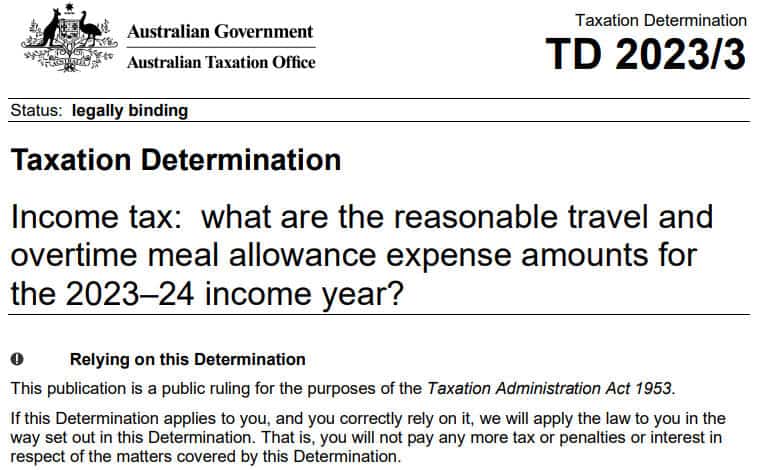
Table 1:Reasonable amounts for domestic travel expenses – employee’s annual salary $138,790 or less
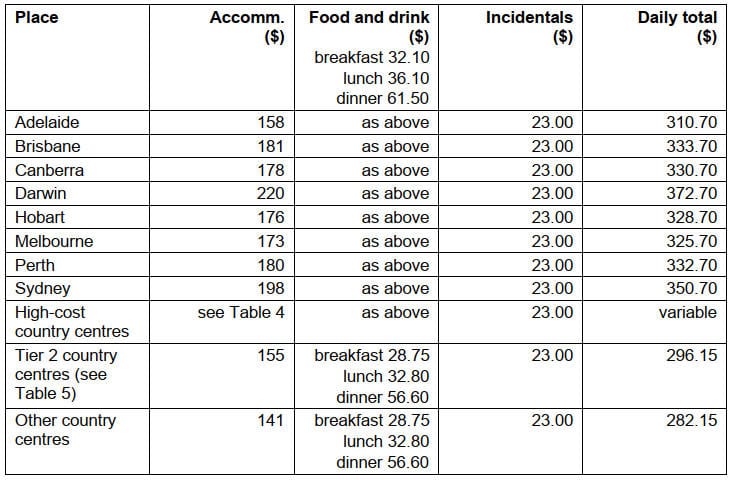
Table 2: Reasonable amounts for domestic travel expenses – employee’s annual salary $138,791 to $247,020

Table 3: Reasonable amounts for domestic travel expenses – employee’s annual salary $247,021 or more
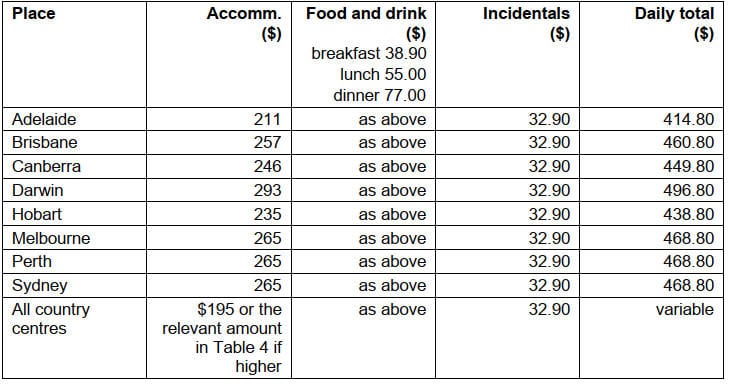
Table 4: Reasonable amounts for domestic travel expenses – high-cost country centres accommodation expenses

Table 5a: Reasonable amounts for domestic travel expenses – employee truck driver’s meals (food and drink)

Table 6: Reasonable amounts for overseas travel expenses – employee’s annual salary $138,790 or less

Table 7: Reasonable amounts for overseas travel expenses – employee’s annual salary $138,791 to $247,020

Table 8: Reasonable amounts for overseas travel expenses – employee’s annual salary $247,021 or more

Allowances for 2022-23
The full document in PDF format: 2022-23 Determination TD 2022/10 (pdf).
The 2022-23 reasonable amount for overtime meal expenses is $33.25.
Reasonable amounts given for meals for employee truck drivers are as follows:
- breakfast $26.80
- lunch $30.60
- dinner $52.75
2022-23 Domestic Travel
Table 1: Salary $133,450 and below
Table 2: Salary $133,451 to $237,520
Table 3: Salary $237,521 and above
2022-23 Overseas Travel
Table 6: Salary $133,450 and below
Table 7: Salary – $133,451 to $237,520
Table 8: Salary – $237,521 and above
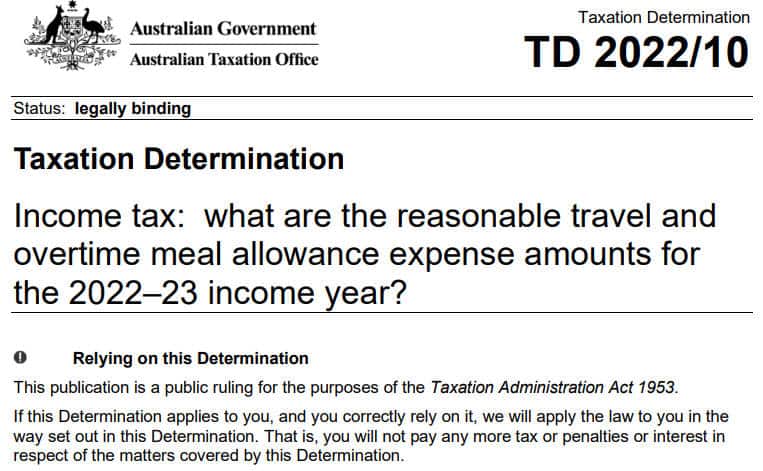
Table 1: Reasonable amounts for domestic travel expenses – employee’s annual salary $133,450 and below
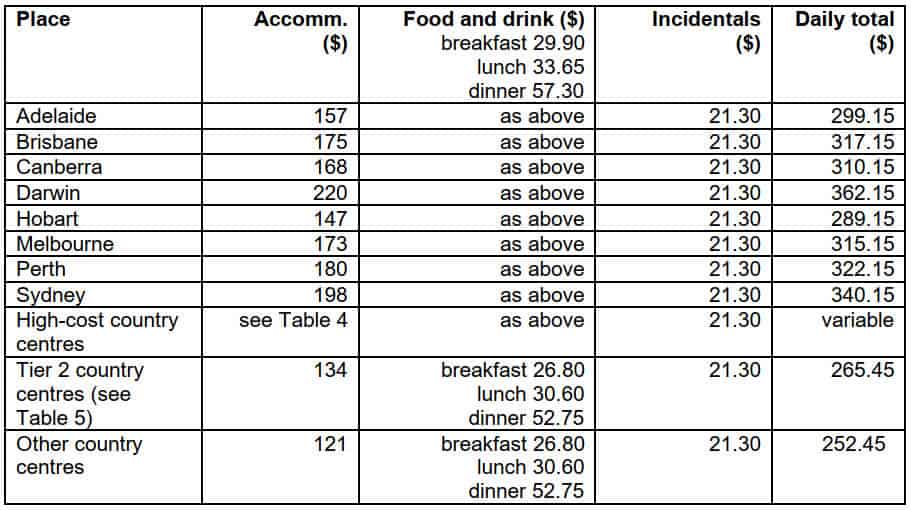
Table 2: Reasonable amounts for domestic travel expenses – employee’s annual salary $133,451 to $237,520
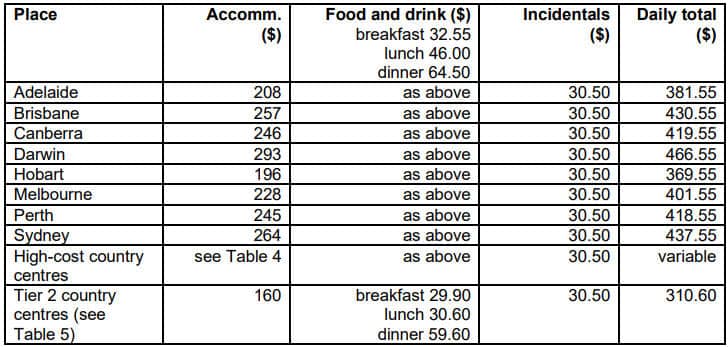
Table 3: Reasonable amounts for domestic travel expenses – employee’s annual salary $237,521 and above
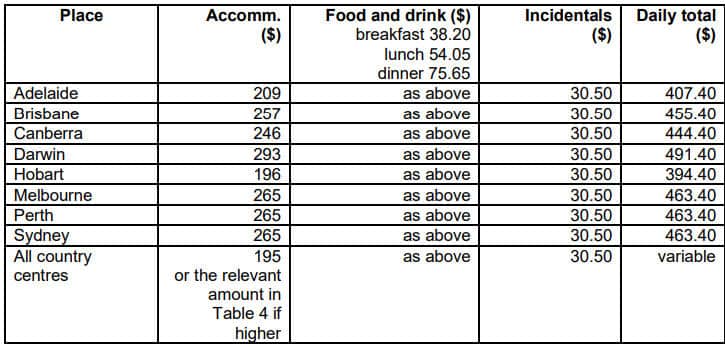
Table 4: Reasonable amounts for domestic travel expenses – high-cost country centres accommodation expenses
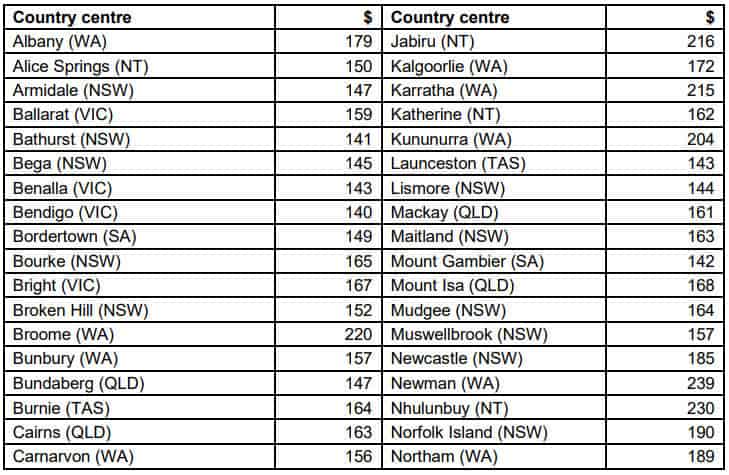
Table 5a: Reasonable amounts for domestic travel expenses – employee truck driver’s meals (food and drink)

Table 6: Reasonable amounts for overseas travel expenses – employee’s annual salary $133,450 and below

Table 7: Reasonable amounts for overseas travel expenses – employee’s annual salary $133,451 to $237,520

Table 8: Reasonable amounts for overseas travel expenses – employee’s annual salary $237,521 and above

Allowances for 2021-22
The full document in PDF format: 2021-22 Determination TD 2021/6 (pdf).
The document displayed with links to each sections is set out below.
For the 2021-22 income year the reasonable amount for overtime meal expenses is $32.50
2021-22 Domestic Travel
Table 1: Salary $129,250 and below
Table 2: Salary $129,251 to $230,050
Table 3: Salary $230,051 and above
2021-22 Overseas Travel
Table 6: Salary $129,250 and below
Table 7: Salary – $129,251 to $230,050
Table 8: Salary – $230,051 and above
2021-22 Domestic Table 1: Employee’s annual salary – $129,250 and below
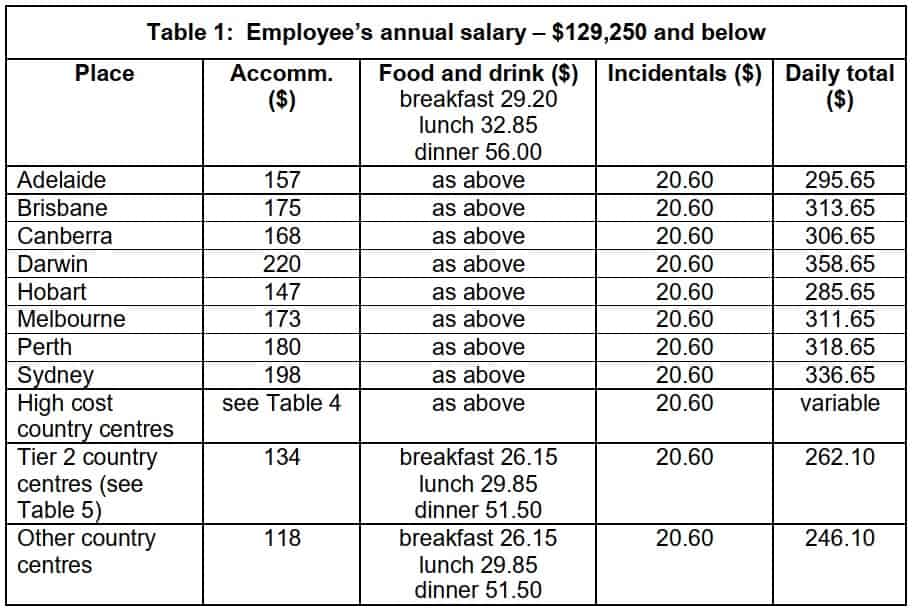
2021-22 Domestic Table 2: Employee’s annual salary – $129,251 to $230,050
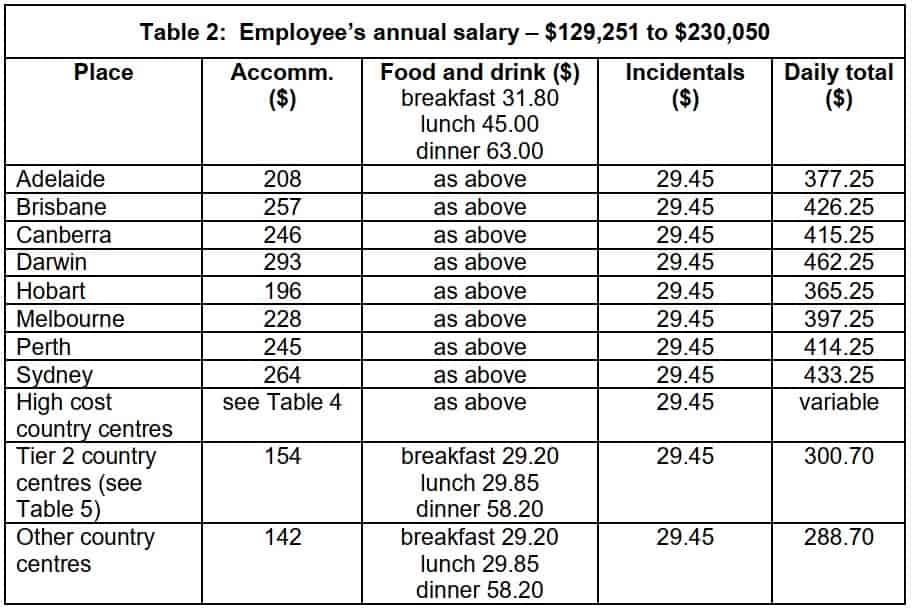
2021-22 Domestic Table 3: Employee’s annual salary – $230,051 and above
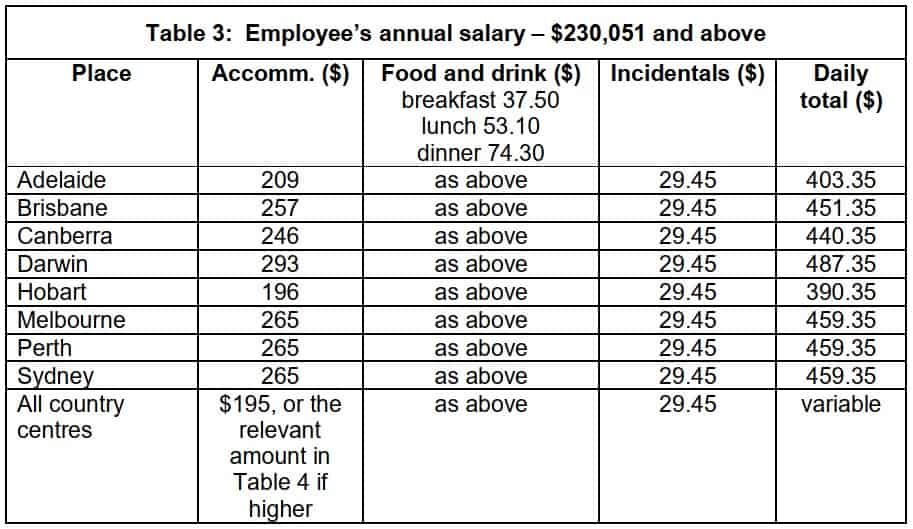
2021-22 Domestic Table 4: High cost country centres – accommodation expenses
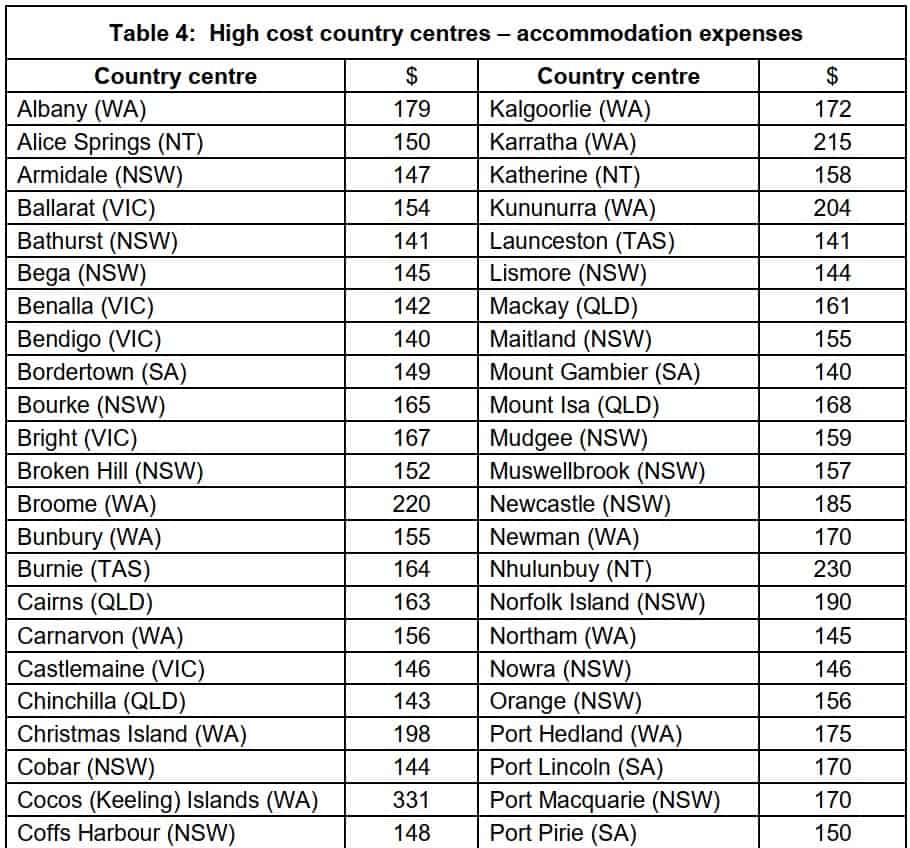
2021-22 Domestic Table 5: Tier 2 country centres
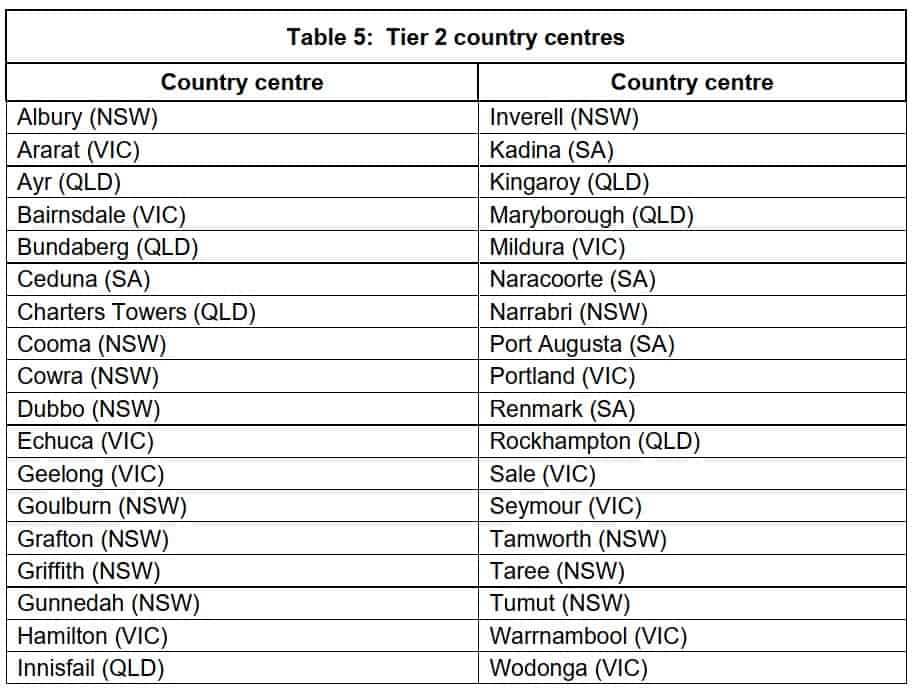
2021-22 Domestic Table 5a: Employee truck driver’s meals (food and drink)

2021-22 Overseas Table 6: Employee’s annual salary – $129,250 and below

2021-22 Overseas Table 7: Employee’s annual salary – $129,251 to $230,050

2021-22 Overseas Table 8: Employee’s annual salary – $230,051 and above

2021-22 Overseas Table 9: Table of countries
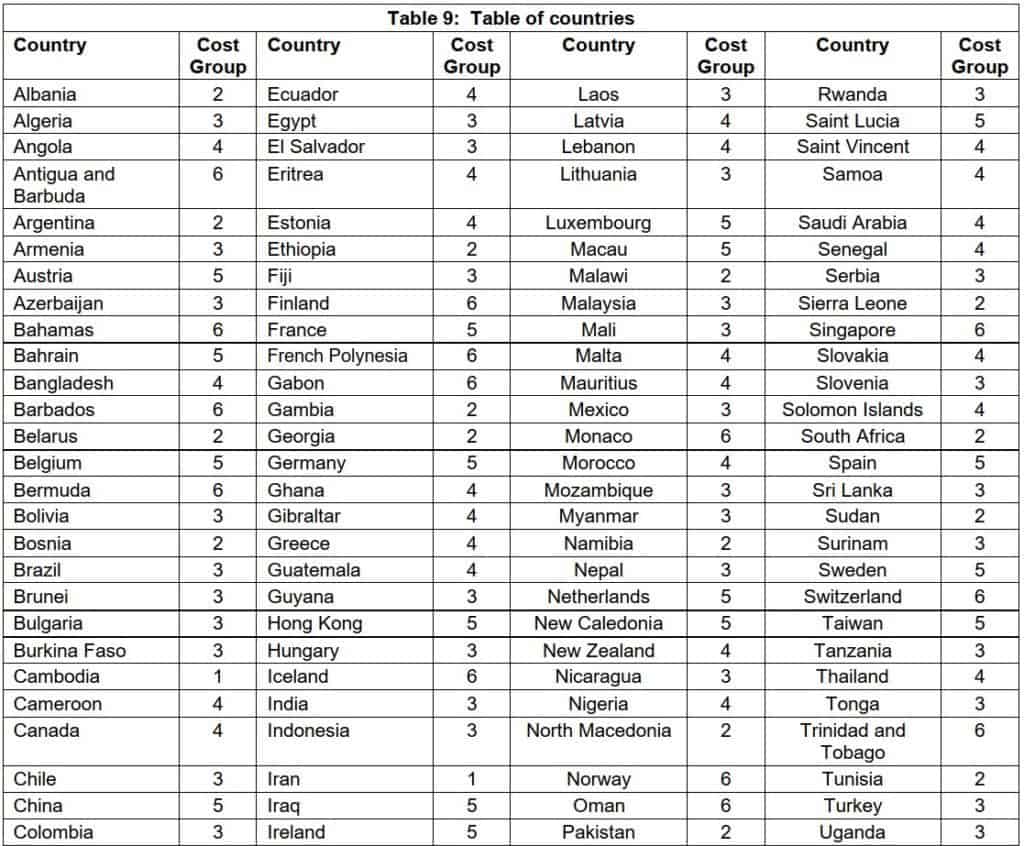
Allowances for 2020-21
Download full document in PDF format: 2020-21 Determination TD 2020/5 (pdf).
The document displayed with links to each section is set out below.
For the 2020-21 income year the reasonable amount for overtime meal expenses is $31.95 .
2020-21 Domestic Travel
Table 1: Salary $126,970 and below
Table 2: Salary $126,971 to $225,980
Table 3: Salary $225,981 and above
2020-21 Overseas Travel
Table 6: Salary $126,970 and below
Table 7: Salary – $126,971 to $225,980
Table 8: Salary – $225,981 and above
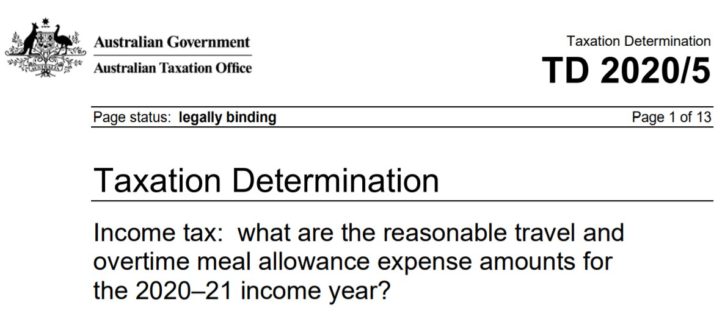
2020-21 Domestic Travel 2020-21 Domestic Table 1: Employee’s annual salary – $126,970 and below
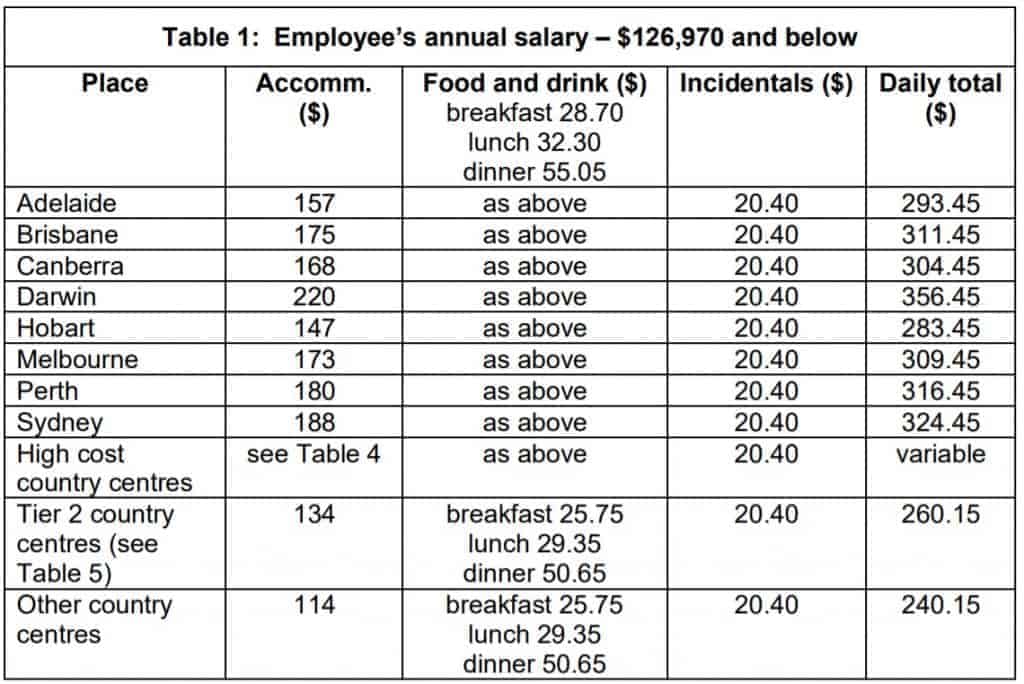
2020-21 Domestic Table 2: Employee’s annual salary – $126,971 to $225,980
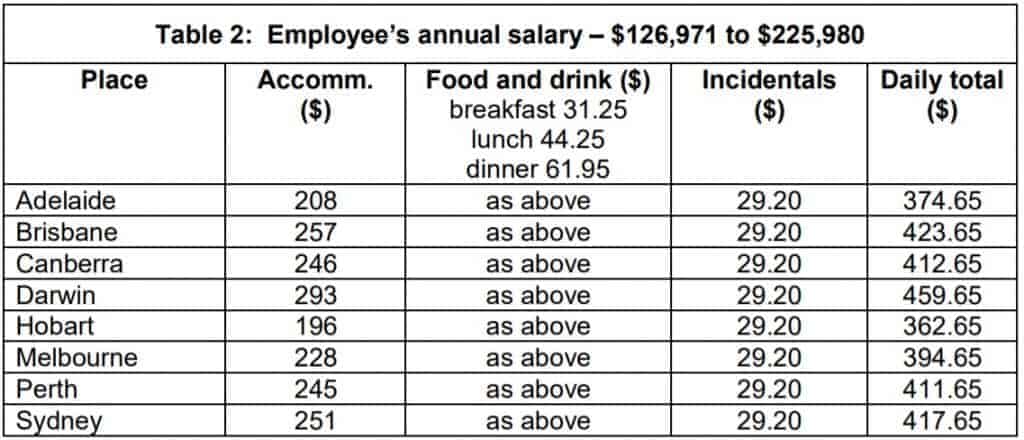
2020-21 Domestic Table 3: Employee’s annual salary – $225,981 and above
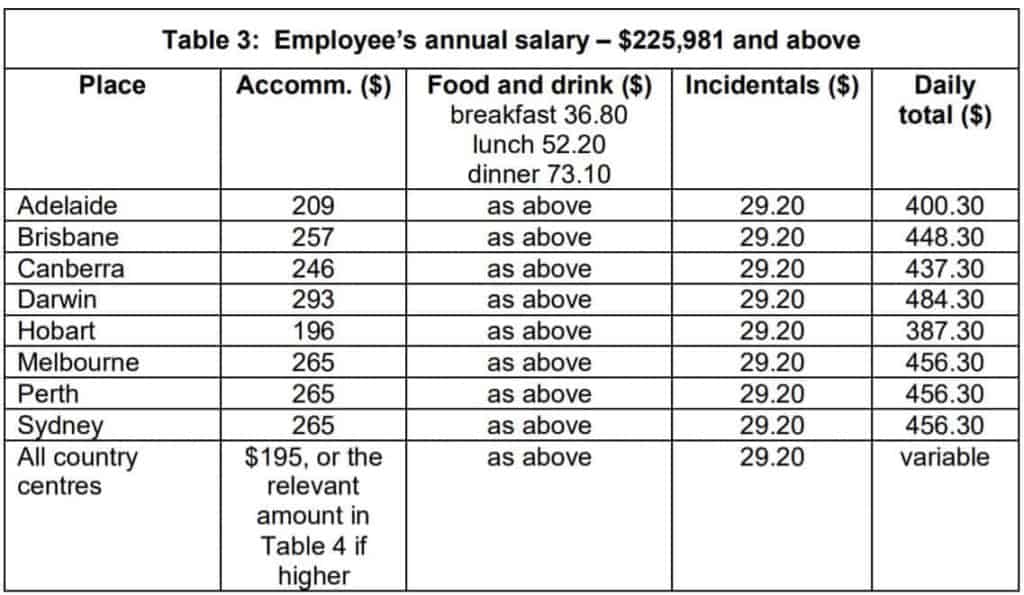
2020-21 Domestic Table 4: High cost country centres – accommodation expenses
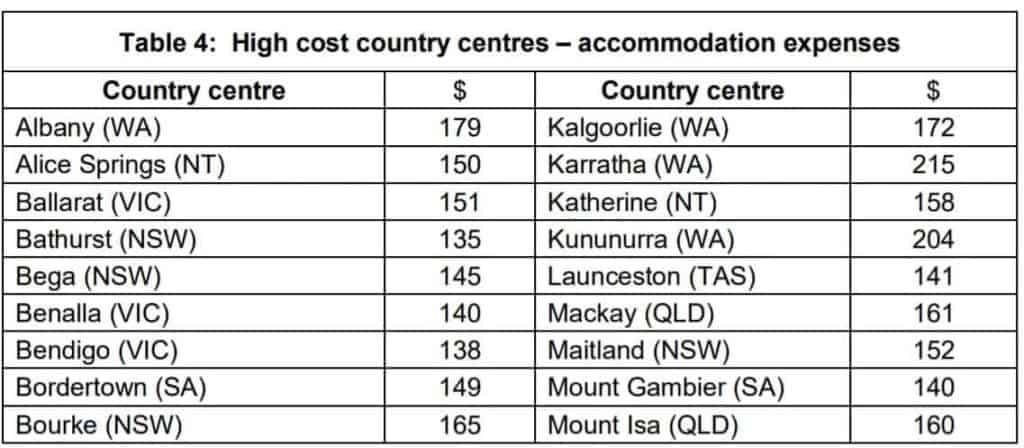

2020-21 Domestic Table 5: Tier 2 country centres
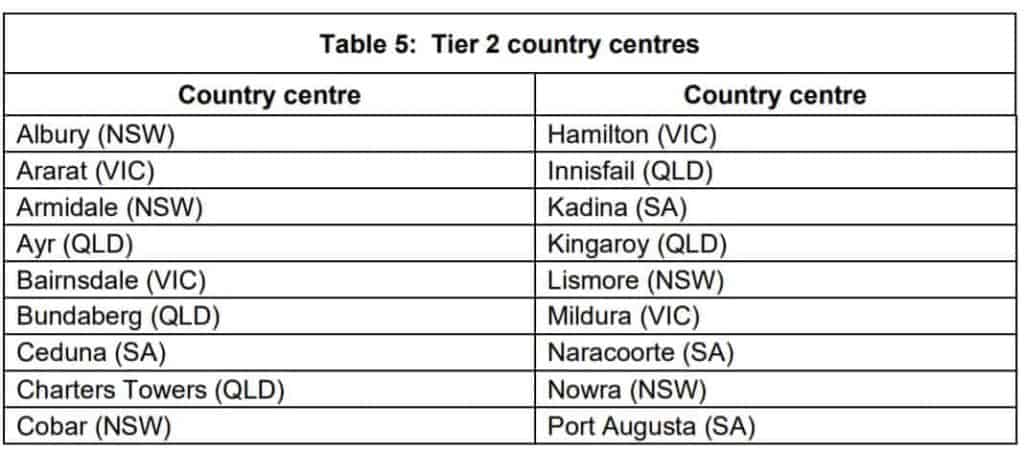
2020-21 Domestic Table 5a: Employee truck driver’s meals (food and drink)

2020-21 Overseas Travel 2020-21 Overseas Table 6: Employee’s annual salary – $126,970 and below

2020-21 Overseas Table 7: Employee’s annual salary – $126,971 to $225,980

2020-21 Overseas Table 8: Employee’s annual salary – $225,981 and above

2020-21 Overseas Table 9: Table of countries
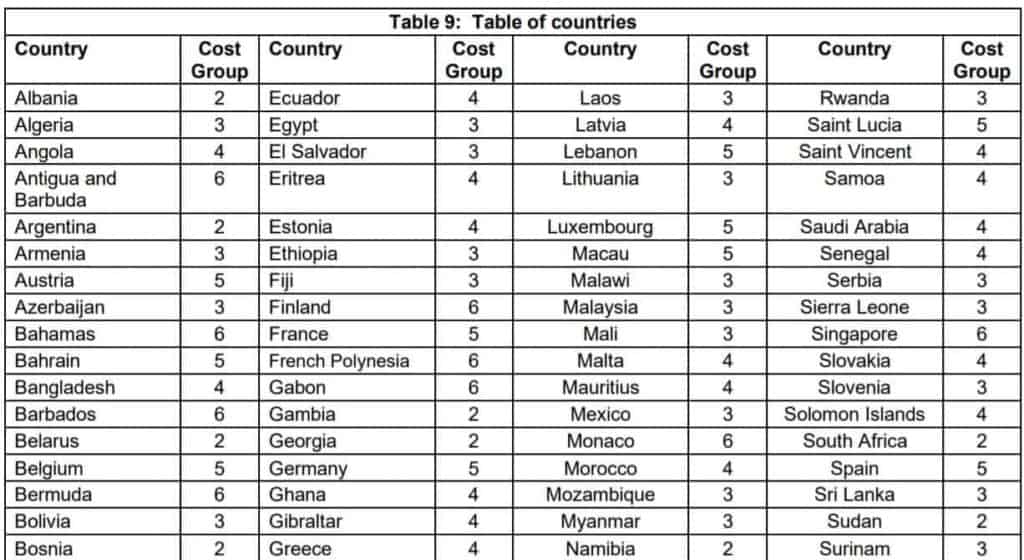
Allowances for 2019-20
The determination in sections:
Domestic Travel
Table 1: Employee’s annual salary – $124,480 and below
Table 2: Employee’s annual salary – $124,481 to $221,550
Table 3: Employee’s annual salary – $221,551 and above
Table 4: High cost country centres – accommodation expenses
Table 5a: Employee truck driver’s meals (food and drink)
Overseas Travel
Table 6: Employee’s annual salary – $124,480 and below
Table 7: Employee’s annual salary – $124,481 to $221,550
Table 8: Employee’s annual salary – $221,551 and above
For the 2019-20 income year the reasonable amount for overtime meal expenses is $31.25.
The reasonable travel and overtime meal allowance expense amounts commencing 1 July 2019 for the 2019-20 income year are contained in Tax Determination TD 2019/11 (issued 3 July 2019).
Download the PDF or view online here .
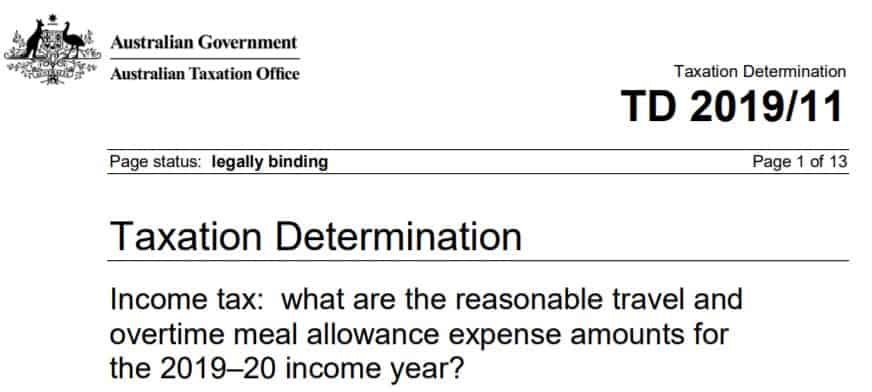
Domestic Travel Table 1: Employee’s annual salary – $124,480 and below

Domestic Travel Table 2: Employee’s annual salary – $124,481 to $221,550

Domestic Travel Table 3: Employee’s annual salary – $221,551 and above

Domestic Travel Table 4: High cost country centres – accommodation expenses

Domestic Travel Table 5: Tier 2 country centres
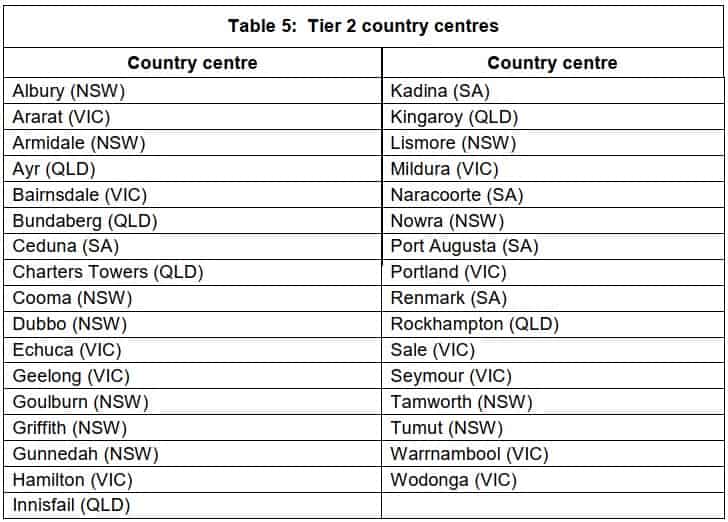
Domestic Travel Table 5a: Employee truck driver’s meals (food and drink)

Overseas Travel Table 6: Employee’s annual salary – $124,480 and below

Overseas Travel Table 7: Employee’s annual salary – $124,481 to $221,550

Overseas Travel Table 8: Employee’s annual salary – $221,551 and above

Overseas Travel Table 9: Table of countries
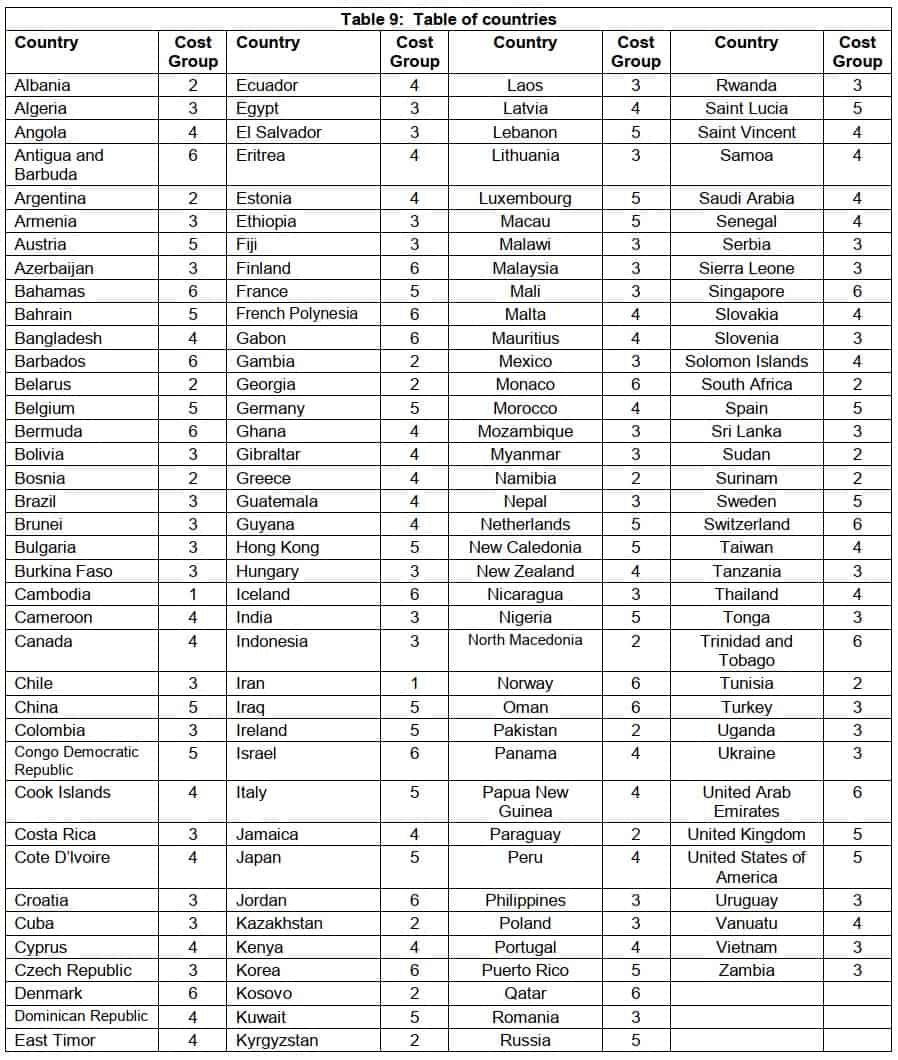
Substantiation and Compliance
Taxation Ruling TR 2004/6 explains the the way in which the expenses can be claimed within the substantiation rules, including the requirement to obtain written evidence and exemptions to that requirement.
Allowances which are ‘reasonable’ , i.e. comply with the Reasonable Allowance determination amounts and with TR 2004/6 are not required to be declared as income and are excluded from the expense substantiation requirements.
These substantiation rules only apply to employees. Non-employees must fully substantiate their travel expense claims. Expenses for non-working accompanying spouses are excluded.
Key points :
To be claimable as a tax deduction, and to be excluded from the expense substantiation requirements, travel and overtime meal allowances must:
- be for work-related purposes; and
- be supported by payments connected to the relevant expense
- for travel allowance expenses, the employee must sleep away from home
- if the amount claimed is more than the ‘reasonable’ amount set out in the Tax Determination, then the whole claim must be substantiated
- employees can be required to verify the facts relied upon to claim a tax deduction and/or the exclusion from the substantiation requirements
- an allowance conforming to the guidelines doesn’t need to be declared as income or claimed in the employee’s tax return, unless it has been itemised on the statement of earnings. Amounts of genuine reasonable allowances provided to employees(excludng overseas accommodation) are not required to be subjected to tax withholdings or itemised on an employee’s statement of earnings.
- claims which don’t match the amount of the allowance need to be declared.
The Tax Office has issued guidance on their position.
[11 August 2021] Taxation Ruling TR 2021/4 reviews the tax treatment of accommodation and food and drink expenses, and provides 14 examples which distinguish non-deductible living expenses from deductible travelling on work expenses. FBT implications for the ‘otherwise deductible’ rule and travel and LAFHA allowances are also considered.
[11 August 2021] Practical Compliance Guideline PCG 2021/3 (which finalises draft PCG 2021/D1 ) provides the ATO’s compliance approach to determining if allowances or benefits provided to an employee are travelling on work, or living at a location.
For FBT purposes an employee is deemed to be travelling on work if they are away for no more than 21 consecutive days, and fewer than 90 days in the same work location in a FBT year.
See also: Travel between home and work and LAFHA Living Away From Home
The issue of annual determination TD 2017/19 for the 2017-18 year marked a tightening of the Tax Office’s interpretation of the necessary conditions for the relief of allowances from the substantiation rules, which would otherwise require full documentary evidence (e.g. receipts) and travel records. (900-50(1))
For a full discussion of the issues, this article from Bantacs is recommended: Reasonable Allowance Concessions Effectively Abolished By The ATO .
Prior to 2017-18
In summary: Prior to 2017-18 the Tax Office rulings stated the general position that provided a travel allowance was ‘reasonable’ (i.e. followed the ATO-determined amounts) then substantiation with written evidence was not required. “In appropriate cases”, however employees may have been required to show how their claim was calculated and that the expense was actually incurred.
What changed
The relevant wording was changed in the 2017-18 determination to now require that more specific additional evidence be available if requested. This additional evidence is not prescribed in the tax rules, but represents a higher administrative standard being applied by the Tax Office.
The required evidence includes being able to show:
- you spent the money on work duties (e.g. away from home overnight for work)
- how the claim was worked out (e.g. diary record)
- you spent the money yourself (e.g. credit card statement, banking records)
- you were not reimbursed (e.g. letter from employer)
Other requirements highlighted by the Bantacs article include:
- a representative sample of receipts may be required to show that a reasonable allowance (or part of it) has actually been spent (TD 2017/19 para 20)
- hostels or caravan parks are not considered eligible for the accommodation component of a reasonable allowance because they are not the right kind of “commercial establishment”, examples of which are hotels, motels and serviced apartments (para 14)
- reasonable amounts for meals can only be for meals within the specific hours of travel (not days), and can only be for breakfast, lunch or dinner (para 15), and therefore could exclude, for example, meals taken during a period of night work.
Tip : The reasonable amount for incidentals still applies in full to each day of travel covered by the allowance, without the need to apportion for any part day travel on the first and last day. (para 16).
Alternative: business travel expense claims
With the burden of proof on ‘reasonable allowance’ claims potentially quite high, an alternative is to opt for a travel expense claim made out under the general substantiation rules for employees, or under the general rules for deductibility for businesses.
The kind of business travel expenses referred to here could include:
Airfares Accommodation Meals Car hire Incidentals (e.g. taxi fares)
The Tax Office has an article describing how to meet the requirements for claiming travel expenses as a tax deduction. See: Claiming a tax deduction for business travel expenses
Travel diary
A travel diary is required by sole traders and partners for overnight expenses and recommended for everyone else (including companies and trusts).
It is important to exclude any private portion of travelling expense which is non-deductible, or if paid on behalf of an employee gives rise to an FBT liability.
For example the expenses of a non-business associate (e.g. spouse), the cost of private activities such as sight-seeing, and accommodation and associated expenses for the non-business portion of a trip.
Airfares to and from a business travel destination would not need to be apportioned if the private element of the trip such as sightseeing was only incidental to the main purpose and time spent.
This is an example of a travel diary for Rebecca who owns a business as a sole trader landscape gardener. (courtesy of ATO Tax Time Fact Sheet )
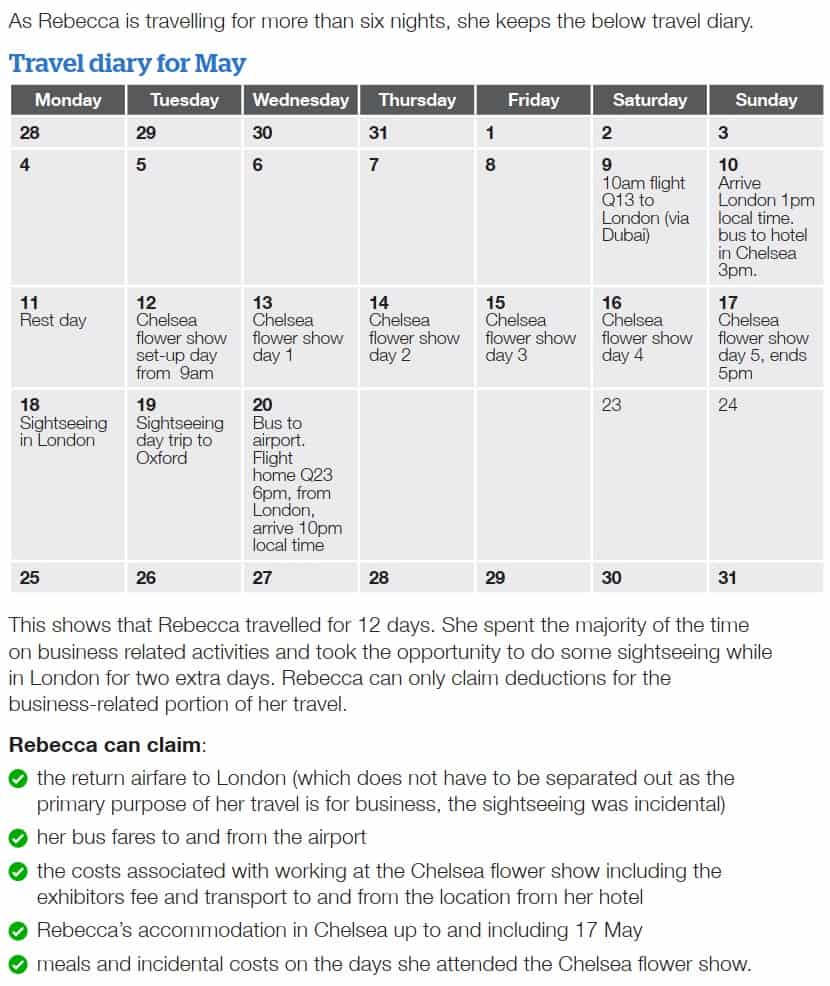
Allowances for 2018-19
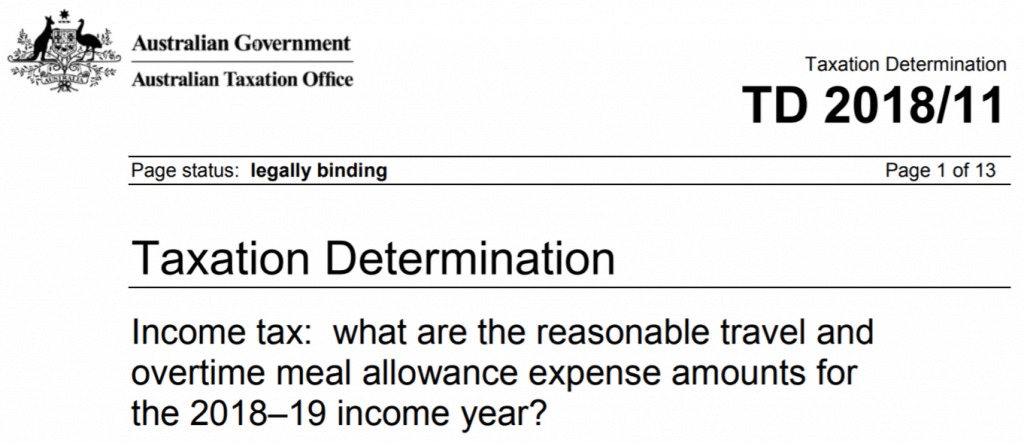
For the 2018-19 income year the reasonable amount for overtime meal allowance expenses is $30.60 .
The meal-by-meal amounts for employee long distance truck drivers are $24.70, $28.15 and $48.60 per day for breakfast, lunch and dinner respectively.
This determination includes ATO reasonable allowances for
(a) overtime meal expenses – for food and drink when working overtime (b) domestic travel expenses – for accommodation, food and drink, and incidentals when travelling away from home overnight for work (particular reasonable amounts are given for employee truck drivers, office holders covered by the Remuneration Tribunal and Federal Members of Parliament) (c) overseas travel expenses – for food and drink, and incidentals when travelling overseas for work
Allowances for 2017-18
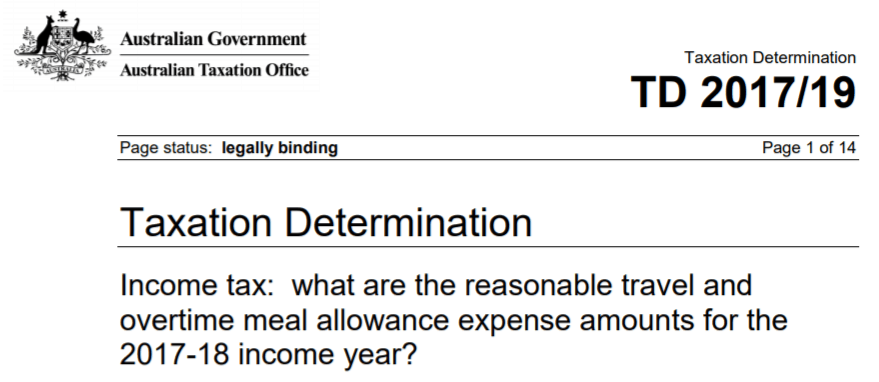
An addendum was issued modifying paragraphs 23 to 30 of determination TD 2017/19 setting out the new reasonable amounts, and consolidated into TD 2017/19 as linked above. For reference purposes, the first-released version of TD 2017/19 issued 3 July 2017 is linked here .
2017-18 Addendum: ATO reinstates the meal-by-meal approach for truck drivers’ travel expense claims
On 27 October 2017 the ATO announced the reinstatement of the meal-by-meal approach for truck drivers who claim domestic travel expenses for meals. The following new reasonable amounts have now been included in an updated version of the current ruling (see on page 7):
For the 2017-18 income year the reasonable amount for overtime meal allowance expenses is $30.05 .
This determination contains ATO reasonable allowances for:
- overtime meals
- domestic travel
- employee truck drivers
- overseas travel
- $24.25 for breakfast
- $27.65 for lunch
- $47.70 for dinner
The amount for each meal is separate and can’t be combined into a single daily amount or moved from one meal to another.
See: ATO media release
Allowances for 2016-17
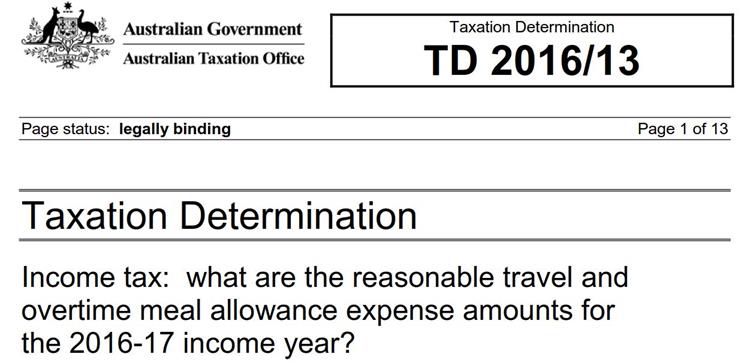
For the 2016-17 income year the reasonable amount for overtime meal allowance expenses is $29.40 .
Allowances for 2015-16
Download the PDF or view online here . For the 2015-16 income year the reasonable amount for overtime meal allowance expenses is $ 28.80 .
Allowances for 2014-15
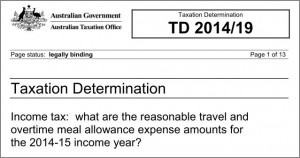
Allowances for 2013-14
The reasonable travel and overtime meal allowance expense amounts for the 2013-14 income year are contained in Tax Determination TD 2013/16 . For the 2013-14 income year the reasonable amount for overtime meal allowance expenses is $ 27.70 .
Allowances for 2012-13
The reasonable travel and overtime meal allowance expense amounts for the 2012-13 income year are contained in Tax Determination TD 2012/17 . For the 2012-13 income year the reasonable amount for overtime meal allowance expenses is $27.10
Allowances for 2011-12
The reasonable travel and overtime meal allowance expense amounts for the 2011-12 income year are contained in Tax Determination TD 2011/017 . For the 2011-12 income year the reasonable amount for overtime meal allowance expenses is $26.45
This page was last modified 2023-06-28
- ATO Community
- Legal Database
- What's New
Log in to ATO online services
Access secure services, view your details and lodge online.
Car and travel expenses 2024
You may be able to claim deductions for work-related car expenses and work-related travel expenses.
Published 29 May 2024
Things you need to know
Work-related car expenses and work-related travel expenses are expenses you incur in the course of performing your job as an employee. You claim deductions for them at questions D1 and D2 .
You can claim
You claim a deduction for work-related expenses at question D1 Work-related car expenses 2024 for a car you either:
- leased or hired under a hire purchase agreement (and the expense is not a travel expense, which you show at question D2 Work-related travel expenses 2024 ).
You can claim the following work-related car and travel expenses at question D2 Work-related travel expenses 2024 :
- expenses for vehicles with a carrying capacity of one tonne or more, or 9 or more passengers (for example, utility trucks and panel vans)
- expenses for motorcycles
- short-term car hire
- public transport fares
- bridge and road tolls
- parking fees
- petrol, oil and repair costs relating to work-related travel you did in a car owned or leased by someone else
- meal, accommodation, and incidental expenses you incurred while away overnight for work.
The deductions include the cost of trips you undertake in the course of performing your work duties, which may also include trips between your home and your workplace if:
- you used your car because you had to carry bulky tools or equipment that you used for work and could not leave at your workplace (for example, an extension ladder or cello)
- your home was a base of employment (that is, you were required to start your work at home and travel to a workplace to continue your work for the same employer)
- you had shifting places of employment (that is, you regularly worked at more than one site each day before returning home).
Work-related car and travel expenses also include the cost of trips:
- between 2 separate places of employment when you have a second job, providing one of those places is not your home
- from your normal workplace or your home to an alternative workplace that is not a regular workplace (for example, a client’s premises) while you are on duty
- from an alternative workplace that is not a regular workplace back to your normal workplace or directly home.
If the travel was partly private, you can claim only the work-related part.
For more information, see Cars, transport and travel .
You can't claim
You can't claim normal trips between your home and your workplace, even if:
- you did minor work-related tasks at home or between home and your workplace
- you travelled between your home and workplace more than once a day
- you were on call
- there was no public transport near work
- you worked outside normal business hours
- your home was a place where you ran your own business and you travelled directly to a place of employment where you worked for somebody else.
Award transport payments
If you received an award transport payment that was paid under an industrial law or award in force on 29 October 1986, see Award transport payments .
Where to go next
- Go to question D1 Work-related car expenses 2024 .
- Return to main menu Individual tax return instructions 2024 .
- Go back to Claiming deductions 2024 .
An official website of the United States Government
- Kreyòl ayisyen
- Search Toggle search Search Include Historical Content - Any - No Include Historical Content - Any - No Search
- Menu Toggle menu
- INFORMATION FOR…
- Individuals
- Business & Self Employed
- Charities and Nonprofits
- International Taxpayers
- Federal State and Local Governments
- Indian Tribal Governments
- Tax Exempt Bonds
- FILING FOR INDIVIDUALS
- How to File
- When to File
- Where to File
- Update Your Information
- Get Your Tax Record
- Apply for an Employer ID Number (EIN)
- Check Your Amended Return Status
- Get an Identity Protection PIN (IP PIN)
- File Your Taxes for Free
- Bank Account (Direct Pay)
- Payment Plan (Installment Agreement)
- Electronic Federal Tax Payment System (EFTPS)
- Your Online Account
- Tax Withholding Estimator
- Estimated Taxes
- Where's My Refund
- What to Expect
- Direct Deposit
- Reduced Refunds
- Amend Return
Credits & Deductions
- INFORMATION FOR...
- Businesses & Self-Employed
- Earned Income Credit (EITC)
- Child Tax Credit
- Clean Energy and Vehicle Credits
- Standard Deduction
- Retirement Plans
Forms & Instructions
- POPULAR FORMS & INSTRUCTIONS
- Form 1040 Instructions
- Form 4506-T
- POPULAR FOR TAX PROS
- Form 1040-X
- Circular 230
Topic no. 511, Business travel expenses
More in help.
- Interactive Tax Assistant
- Report Phishing
- Fraud/Scams
- Notices and Letters
- Frequently Asked Questions
- Accessibility
- Contact Your Local IRS Office
- Contact an International IRS Office
- Other Languages
Travel expenses are the ordinary and necessary expenses of traveling away from home for your business, profession, or job. You can't deduct expenses that are lavish or extravagant, or that are for personal purposes.
You're traveling away from home if your duties require you to be away from the general area of your tax home for a period substantially longer than an ordinary day's work, and you need to get sleep or rest to meet the demands of your work while away.
Generally, your tax home is the entire city or general area where your main place of business or work is located, regardless of where you maintain your family home. For example, you live with your family in Chicago but work in Milwaukee where you stay in a hotel and eat in restaurants. You return to Chicago every weekend. You may not deduct any of your travel, meals or lodging in Milwaukee because that's your tax home. Your travel on weekends to your family home in Chicago isn't for your work, so these expenses are also not deductible. If you regularly work in more than one place, your tax home is the general area where your main place of business or work is located.
In determining your main place of business, take into account the length of time you normally need to spend at each location for business purposes, the degree of business activity in each area, and the relative significance of the financial return from each area. However, the most important consideration is the length of time you spend at each location.
You can deduct travel expenses paid or incurred in connection with a temporary work assignment away from home. However, you can't deduct travel expenses paid in connection with an indefinite work assignment. Any work assignment in excess of one year is considered indefinite. Also, you may not deduct travel expenses at a work location if you realistically expect that you'll work there for more than one year, whether or not you actually work there that long. If you realistically expect to work at a temporary location for one year or less, and the expectation changes so that at some point you realistically expect to work there for more than one year, travel expenses become nondeductible when your expectation changes.
Travel expenses for conventions are deductible if you can show that your attendance benefits your trade or business. Special rules apply to conventions held outside the North American area.
Deductible travel expenses while away from home include, but aren't limited to, the costs of:
- Travel by airplane, train, bus or car between your home and your business destination. (If you're provided with a ticket or you're riding free as a result of a frequent traveler or similar program, your cost is zero.)
- The airport or train station and your hotel,
- The hotel and the work location of your customers or clients, your business meeting place, or your temporary work location.
- Shipping of baggage, and sample or display material between your regular and temporary work locations.
- Using your car while at your business destination. You can deduct actual expenses or the standard mileage rate, as well as business-related tolls and parking fees. If you rent a car, you can deduct only the business-use portion for the expenses.
- Lodging and non-entertainment-related meals.
- Dry cleaning and laundry.
- Business calls while on your business trip. (This includes business communications by fax machine or other communication devices.)
- Tips you pay for services related to any of these expenses.
- Other similar ordinary and necessary expenses related to your business travel. (These expenses might include transportation to and from a business meal, public stenographer's fees, computer rental fees, and operating and maintaining a house trailer.)
Instead of keeping records of your meal expenses and deducting the actual cost, you can generally use a standard meal allowance, which varies depending on where you travel. The deduction for business meals is generally limited to 50% of the unreimbursed cost.
If you're self-employed, you can deduct travel expenses on Schedule C (Form 1040), Profit or Loss From Business (Sole Proprietorship) , or if you're a farmer, on Schedule F (Form 1040), Profit or Loss From Farming .
If you're a member of the National Guard or military reserve, you may be able to claim a deduction for unreimbursed travel expenses paid in connection with the performance of services as a reservist that reduces your adjusted gross income. This travel must be overnight and more than 100 miles from your home. Expenses must be ordinary and necessary. This deduction is limited to the regular federal per diem rate (for lodging, meals, and incidental expenses) and the standard mileage rate (for car expenses) plus any parking fees, ferry fees, and tolls. Claim these expenses on Form 2106, Employee Business Expenses and report them on Form 1040 , Form 1040-SR , or Form 1040-NR as an adjustment to income.
Good records are essential. Refer to Topic no. 305 for information on recordkeeping. For more information on these and other travel expenses, refer to Publication 463, Travel, Entertainment, Gift, and Car Expenses .

Everything You Need to Know About the Business Travel Tax Deduction
.jpeg)
Justin is an IRS Enrolled Agent, allowing him to represent taxpayers before the IRS. He loves helping freelancers and small business owners save on taxes. He is also an attorney and works part-time with the Keeper Tax team.
You don’t have to fly first class and stay at a fancy hotel to claim travel expense tax deductions. Conferences, worksite visits, and even a change of scenery can (sometimes) qualify as business travel.
What counts as business travel?
The IRS does have a few simple guidelines for determining what counts as business travel. Your trip has to be:
- Mostly business
- An “ordinary and necessary” expense
- Someplace far away from your “tax home”
What counts as "mostly business"?
The IRS will measure your time away in days. If you spend more days doing business activities than not, your trip is considered "mostly business". Your travel days are counted as work days.
Special rules for traveling abroad
If you are traveling abroad for business purposes, you trip counts as " entirely for business " as long as you spend less than 25% of your time on personal activities (like vacationing). Your travel days count as work days.
So say you you head off to Zurich for nine days. You've got a seven-day run of conference talks, client meetings, and the travel it takes to get you there. You then tack on two days skiing on the nearby slopes.
Good news: Your trip still counts as "entirely for business." That's because two out of nine days is less than 25%.
What is an “ordinary and necessary” expense?
“Ordinary and necessary” means that the trip:
- Makes sense given your industry, and
- Was taken for the purpose of carrying out business activities
If you have a choice between two conferences — one in your hometown, and one in London — the British one wouldn’t be an ordinary and necessary expense.
What is your tax home?
A taxpayer can deduct travel expenses anytime you are traveling away from home but depending on where you work the IRS definition of “home” can get complicated.
Your tax home is often — but not always — where you live with your family (what the IRS calls your "family home"). When it comes to defining it, there are two factors to consider:
- What's your main place of business, and
- How large is your tax home
What's your main place of business?
If your main place of business is somewhere other than your family home, your tax home will be the former — where you work, not where your family lives.
For example, say you:
- Live with your family in Chicago, but
- Work in Milwaukee during the week (where you stay in hotels and eat in restaurants)
Then your tax home is Milwaukee. That's your main place of business, even if you travel back to your family home every weekend.
How large is your tax home?
In most cases, your tax home is the entire city or general area where your main place of business is located.
The “entire city” is easy to define but “general area” gets a bit tricker. For example, if you live in a rural area, then your general area may span several counties during a regular work week.
Rules for business travel
Want to check if your trip is tax-deductible? Make sure it follows these rules set by the IRS.
1. Your trip should take you away from your home base
A good rule of thumb is 100 miles. That’s about a two hour drive, or any kind of plane ride. To be able to claim all the possible travel deductions, your trip should require you to sleep somewhere that isn’t your home.
2. You should be working regular hours
In general, that means eight hours a day of work-related activity.
It’s fine to take personal time in the evenings, and you can still take weekends off. But you can’t take a half-hour call from Disneyland and call it a business trip.
Here's an example. Let’s say you’re a real estate agent living in Chicago. You travel to an industry conference in Las Vegas. You go to the conference during the day, go out in the evenings, and then stay the weekend. That’s a business trip!
3. The trip should last less than a year
Once you’ve been somewhere for over a year, you’re essentially living there. However, traveling for six months at a time is fine!
For example, say you’re a freelancer on Upwork, living in Seattle. You go down to stay with your sister in San Diego for the winter to expand your client network, and you work regular hours while you’re there. That counts as business travel.
What about digital nomads?
With the rise of remote-first workplaces, many freelancers choose to take their work with them as they travel the globe. There are a couple of requirements these expats have to meet if they want to write off travel costs.
Requirement #1: A tax home
Digital nomads have to be able to claim a particular foreign city as a tax home if they want to write off any travel expenses. You don't have to be there all the time — but it should be your professional home base when you're abroad.
For example, say you've rent a room or a studio apartment in Prague for the year. You regularly call clients and finish projects from there. You still travel a lot, for both work and play. But Prague is your tax home, so you can write off travel expenses.
Requirement #2: Some work-related reason for traveling
As long as you've got a tax home and some work-related reason for traveling, these excursion count as business trips. Plausible reasons include meeting with local clients, or attending a local conference and then extending your stay.
However, if you’re a freelance software developer working from Thailand because you like the weather, that unfortunately doesn't count as business travel.
The travel expenses you can write off
As a rule of thumb, all travel-related expenses on a business trip are tax-deductible. You can also claim meals while traveling, but be careful with entertainment expenses (like going out for drinks!).
Here are some common travel-related write-offs you can take.
🛫 All transportation
Any transportation costs are a travel tax deduction. This includes traveling by airplane, train, bus, or car. Baggage fees are deductible, and so are Uber rides to and from the airport.
Just remember: if a client is comping your airfare, or if you booked your ticket with frequent flier miles, then it isn't deductible since your cost was $0.
If you rent a car to go on a business trip, that rental is tax-deductible. If you drive your own vehicle, you can either take actual costs or use the standard mileage deduction. There's more info on that in our guide to deducting car expenses .
Hotels, motels, Airbnb stays, sublets on Craigslist, even reimbursing a friend for crashing on their couch: all of these are tax-deductible lodging expenses.
🥡 Meals while traveling
If your trip has you staying overnight — or even crashing somewhere for a few hours before you can head back — you can write off food expenses. Grabbing a burger alone or a coffee at your airport terminal counts! Even groceries and takeout are tax-deductible.
One important thing to keep in mind: You can usually deduct 50% of your meal costs. For 2021 and 2022, meals you get at restaurants are 100% tax-deductible. Go to the grocery store, though, and you’re limited to the usual 50%.
{upsell_block}
🌐 Wi-Fi and communications
Wi-Fi — on a plane or at your hotel — is completely deductible when you’re traveling for work. This also goes for other communication expenses, like hotspots and international calls.
If you need to ship things as part of your trip — think conference booth materials or extra clothes — those expenses are also tax-deductible.
👔 Dry cleaning
Need to look your best on the trip? You can write off related expenses, like laundry charges.
{write_off_block}
Travel expenses you can't deduct
Some travel costs may seem like no-brainers, but they're not actually tax-deductible. Here are a couple of common ones to watch our for.
The cost of bringing your child or spouse
If you bring your child or spouse on a business trip, your travel expense deductions get a little trickier. In general, the cost of bring other people on a business trip is considered personal expense — which means it's not deductible.
You can only deduct travel expenses if your child or spouse:
- Is an employee,
- Has a bona fide business purpose for traveling with you, and
- Would otherwise be allowed to deduct the travel expense on their own
Some hotel bill charges
Staying in a hotel may be required for travel purposes. That's why the room charge and taxes are deductible.
Some additional charges, though, won't qualify. Here are some examples of fees that aren't tax-deductible:
- Gym or fitness center fees
- Movie rental fees
- Game rental fees
{email_capture}
Where to claim travel expenses when filing your taxes
If you are self-employed, you will claim all your income tax deduction on the Schedule C. This is part of the Form 1040 that self-employed people complete ever year.
What happens if your business deductions are disallowed?
If the IRS challenges your business deduction and they are disallowed, there are potential penalties. This can happen if:
- The deduction was not legitimate and shouldn't have been claimed in the first place, or
- The deduction was legitimate, but you don't have the documentation to support it
When does the penalty come into play?
The 20% penalty is not automatic. It only applies if it allowed you to pay substantially less taxes than you normally would. In most cases, the IRS considers “substantially less” to mean you paid at least 10% less.
In practice, you would only reach this 10% threshold if the IRS disqualified a significant number of your travel deductions.
How much is the penalty?
The penalty is normally 20% of the difference between what you should have paid and what you actually paid. You also have to make up the original difference.
In total, this means you will be paying 120% of your original tax obligation: your original obligation, plus 20% penalty.
.jpeg)
Justin W. Jones, EA, JD

Over 1M freelancers trust Keeper with their taxes
Keeper is the top-rated all-in-one business expense tracker, tax filing service, and personal accountant.

Sign up for Tax University
Get the tax info they should have taught us in school

Expense tracking has never been easier
What tax write-offs can I claim?
At Keeper, we’re on a mission to help people overcome the complexity of taxes. We’ve provided this information for educational purposes, and it does not constitute tax, legal, or accounting advice. If you would like a tax expert to clarify it for you, feel free to sign up for Keeper. You may also email [email protected] with your questions.
Voted best tax app for freelancers
More Articles to Read
Free Tax Tools
1099 Tax Calculator
- Quarterly Tax Calculator
How Much Should I Set Aside for 1099 Taxes?
Keeper users have found write-offs worth
- Affiliate program
- Partnership program
- Tax bill calculator
- Tax rate calculator
- Tax deduction finder
- Quarterly tax calculator
- Ask an accountant
- Terms of Service
- Privacy Policy
- Affiliate Program
- Partnership Program
- Tax Bill Calculator
- Tax Rate Calculator
- Tax Deduction Finder
- Ask an Accountant

COMMENTS
Your business can claim a deduction for travel expenses related to your business, whether the travel is taken within a day, overnight, or for many nights. Expenses you can claim include: airfares. train, tram, bus, taxi, or ride-sourcing fares. car hire fees and the costs you incur (such as fuel, tolls and car parking) when using a hire car for ...
A travel allowance expense is a deductible travel expense: you incur when you're travelling away from your home overnight to perform your employment duties. that you receive an allowance to cover. for accommodation, meals (food or drink), or incidentals. You incur a travel allowance expense when you either: actually pay an amount for an expense.
If the expense was for both work and private purposes, you can only claim a deduction for the work-related portion. If your total claim for work-related expenses is more than $300, you must have written evidence to prove your claims. Work-related travel expenses include: public transport, air travel and taxi fares. short-term car hire.
Travel expenses incurred before you start your business are not usually deductible and a deductible trip needs to demonstrate a clear connection to your business activities. Where expenditure is part business and part private, you need to apportion your claim. This means you exclude the private component from your claim.
In brief. On 17 February 2021, the Australian Taxation Office (ATO) released the following new guidance in relation to whether an employee is "travelling on work" or otherwise, and the income tax and fringe benefits tax (FBT) treatment of associated travel expenses: Draft Taxation Ruling TR 2021/D1: Income tax and fringe benefit tax ...
This video explains when you can claim travel expenses in your business. For more information, visit https://ato.gov.au/TaxBasicsVideos
Draft Taxation Ruling TR 2021/D1 Income tax and fringe benefits tax: employees: accommodation and food and drink expenses, travel allowances, and living-away-from-home allowances; and. Draft Practical Compliance Guideline (PCG) 2021/D1 - Determining if allowances or benefits provided to an employee relate to travelling on work or living at a ...
The Australian Taxation Office (ATO) has released a new ruling that clarifies what expenses employees can deduct for work-related travel. The new ruling, Income tax: When are deductions allowed for employees' transport expenses? was released this week, bringing together and clarifying the rules for business advisors and their clients alike.
ATO-compliant Travel Allowances. If as an employee you travel and spend the night away from home for work purposes, you are entitled to reimbursement for work-related travel expenses.However, this must not be confused with travel allowances which are payments specifically made to an employee to cover the cost of business-related travel.. This guide provides information on both, highlighting ...
Now that this ruling and guidance is finalised, the ATO's previously announced suite of public guidance on travel is now complete, including TR 2020/1 (public ruling addressing deductions for work expenses) and TR 2021/1 (public ruling addressing deductibility for transport expenses). Where benefits provided to employees include transport, in ...
Allowable Deductions. If the other conditions of claiming a deduction for travel are met, examples of tax deductible travel expenses include: Flights. Accommodation. Meals. Transport. Deductions cannot be claimed for the following travel-related expenses in any circumstances: Visas. Passports.
When you do your tax return, you can claim most business expenses as tax deductions to reduce your taxable income. The Australian Taxation Office (ATO) calculates your taxable income using this formula: Assessable income - tax deductions = taxable income. Most money you get from running your business is assessable income (income subject to tax).
For the 2019-20 income year the reasonable amount for overtime meal expenses is $31.25. The reasonable travel and overtime meal allowance expense amounts commencing 1 July 2019 for the 2019-20 income year are contained in Tax Determination TD 2019/11 (issued 3 July 2019). Download the PDF or view online here.
Types of expenses. As the owner of a small business, you can claim a deduction for expenses that you incur when you travel for your business. Common expenses include: fuel, tolls and car parking. airline, bus, train, tram and taxi or ride-sourcing fares. car-hire fees and the costs you incur when using a hire car for business purposes.
You can claim the following work-related car and travel expenses at question D2 Work-related travel expenses 2024: expenses for vehicles with a carrying capacity of one tonne or more, or 9 or more passengers (for example, utility trucks and panel vans) expenses for motorcycles. short-term car hire. public transport fares.
For information about what expenses you claim as car expenses (item D1) and what expenses you claim as travel expenses (item D2), and some examples of trips you can and cannot claim, see Car and travel expenses 2022. This question is about travel expenses you incur in performing your work as an employee. They include:
Business travel deductions are available when employees must travel away from their tax home or main place of work for business reasons. A taxpayer is traveling away from home if they are away for longer than an ordinary day's work and they need to sleep to meet the demands of their work while away. Travel expenses must be ordinary and ...
Topic no. 511, Business travel expenses. Travel expenses are the ordinary and necessary expenses of traveling away from home for your business, profession, or job. You can't deduct expenses that are lavish or extravagant, or that are for personal purposes. You're traveling away from home if your duties require you to be away from the general ...
To be able to claim all the possible travel deductions, your trip should require you to sleep somewhere that isn't your home. 2. You should be working regular hours. In general, that means eight hours a day of work-related activity. It's fine to take personal time in the evenings, and you can still take weekends off.
Via Forbes Advisor's Website. The average cost of travel insurance is 5% to 6% of your trip costs, according to Forbes Advisor's analysis of travel insurance rates. For a $5,000 trip, the ...